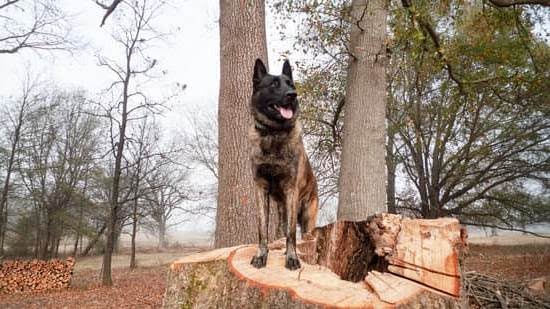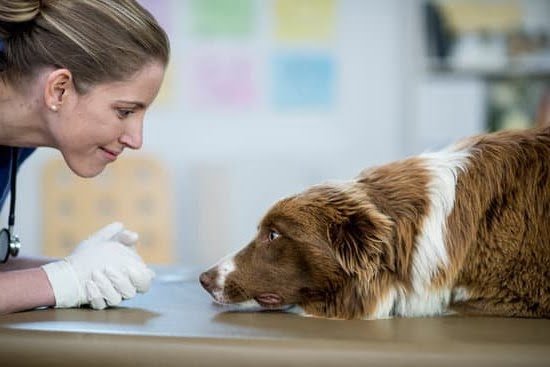Introduction
Becoming a dog trainer for the police involves extensive planning, dedication, and practical skill. It requires more than just an enthusiasm for working with animals; potential trainers must demonstrate a range of skills and abilities that are essential in succeeding on the job. Instructors must have an understanding of canine psychology and behavior; be familiar with various training methods; acquire expertise in tactical tracking, search and rescue work, as well as in aggression control; and be capable of delivering effective instruction to both handlers and their dogs. The path to becoming a dog trainer for the police is long but rewarding, offering candidates a career greatly respected by peers, colleagues, and members of their community.
In order to become a police dog trainer, first prospective trainers should obtain formal education related to animal behavior or canine biology. Animal behavior courses cover topics like anatomy, physiology, communication systems through smell and sound, basic learning principles, animal-human relationships, normal canine development cycles, and different types of health care options available to pets. Alternatively, those looking to specialize in forensic/police canines may opt to pursue degree programs such as criminal justice or law enforcement instead.
Once a formal educational foundation has been established it is time for prospective trainers to gain practical experience working with canines in an operational setting. Most employers prefer candidates who have had at least 2-3yrs experience working with canines either as civilian veterinarians or volunteers at kennels/training facilities where they acquired hands-on training experience under experienced instructors. Individuals may also want to join professional organizations relevant to police work where they can network and look out for postings from law enforcement units when openings arise.
The next step is usually cadet training at local academies where learners will learn more about specific police dog training techniques such as specialized skills like protection scenarios or finding drugs/explosives etc., regulations governing canine services in different states/countries; safety procedures around firearms etc. For those aiming higher – master’s degree programmes may be available focused solely on K9 behaviour science (policing context) which could help them get promotions within their organization quicker than others without the extra qualification might do. Finally upon successful completion of all necessary steps trainers must pass licensing tests set out by their state before they can officially work as certified dog handlers serving the public good!
Job Description and Required Skills
Police dog trainers need to have excellent communication skills and an ability to develop strong relationships with their canine counterparts. They also need to be physically fit and able to handle the challenges of working with large dogs in stressful situations. Dog trainers should have a strong understanding of operant conditioning, how to assess canine responses to commands, and techniques for behavior modification. A basic knowledge of animal body language is required, as well as evidence-based training techniques for reinforcing desired behaviors. Police dog trainers must also possess the ability to quickly distinguish proper behaviors from unacceptable ones and be able to effectively address any issues that arise in their work environment.
To become a police dog trainer, you will typically need specialized training or certification from a professional organization. This typically involves an apprenticeship under the guidance of experienced professionals as well as hands-on practice at a facility where police service dogs are trained. During this period, you will learn how to read a canine’s body language, understand canine psychology and behavior, and properly use rewards-based positive reinforcement techniques while working with service dogs in different environments. Additionally, police dog trainers may be required to take safety courses related to handling large animals so that they can safely work with K9 officers in dangerous scenarios such as tracking down suspects or finding hidden explosives. Finally, it is not uncommon for those wishing to become police dog trainers to hold first aid or CPR certifications so that their response time if something happens on the job is minimal which helps protect both the handler and the service animal’s safety at all times.
Benefits of Being a Police Dog Trainer
Being a police dog trainer is a rewarding and prestigious career, offering the opportunity to work with dedicated law enforcement personnel and create amazing results. Becoming a police dog trainer can be an incredibly rewarding experience for any individual looking to work in a challenging but ultimately fulfilling role. Not only does it provide the satisfaction of helping make our communities safer, but there are some incredible benefits associated with being a police dog trainer.
The primary benefit of becoming a police dog trainer is making an impact on the safety of society. Police dogs are highly trained animals used to assist officers in investigations and protect communities from harm. Thanks to their special training, these dogs are able to locate suspects and help capture wanted criminals as well as sniff out explosives and drugs. With proper training, these amazing animals not only serve as an invaluable asset to law enforcement personnel but also ensure that citizens remain safe throughout their daily lives.
Another benefit of working as a police dog trainer is the opportunity to have an exciting and ever-changing job. The world of criminal investigation and law enforcement is constantly changing and evolving, which means there’s always something new to learn or techniques that need refining. As such, police dog trainers must stay ahead of the curve in order to develop enhanced training methods that keep pace with current trends and needs within the field. This provides great opportunities for personal growth while also ensuring successful career development over time.
Finally, becoming a police dog trainer can be financially beneficial for many individuals thanks to competitive salaries and career advancement opportunities available in this field. Many agencies provide generous salaries with additional bonuses for all trainers involved in successfully completing certain tasks or handling specific cases. In terms of maintaining long-term job security, many departments offer continued certification courses or advancement potentials from advanced positions within the unit should one qualify within certain parameters such set forth by each organization’s guidelines.
Training Process Overview
Becoming a dog trainer for the police requires dedication and hard work. Before you can start working, it is important to understand the training process involved in preparing a police dog.
The first step to becoming a certified police dog trainer is to attend or complete an approved program in canine law enforcement training. You should have an extensive background on canine behavior and care, and specialized knowledge in areas of drug detection, search and rescue, patrol, and agility/obedience training. Most programs last four to eight weeks with intensive hands-on instruction on topics such as identifying behavior problems; teaching commands; administering food rewards; using basic obedience equipment; proper nutrition and healthcare; detecting illicit substances; tracking suspects with scent kits; handling apprehension scenarios safely; and preparing dogs for competition events.
Once you pass through your program successfully, you will then need to demonstrate your skills by attending field training sessions with actual police dogs in order for your certification to be finalized. This field experience will give you more practice dealing with specific situations which cannot be replicated in the classroom. For instance, you may encounter aggressive criminal suspects during apprehension exercises or experience how search dogs handle double blind tests where two separate people hide two scented items containing different odors at different locations.
Finally, you must apply for accreditation from the American Society of Canine Trainers (ASCT) and maintain eligibility through continuing education workshops every two years in order to remain certified as a police dog trainer. Once all these requirements are met and fulfilled successfully, you will now be qualified to become a professional certified police dog trainer!
Essential Skills Needed as a Police Canine Trainer
In order to become a police canine trainer, you will need to develop certain essential skills. One of the most important skills is understanding and accurately interpreting canine behavior. As a trainer, you must be able to recognize when a dog is fearful or anxious and how it might affect the training process. It’s also important to have an in-depth knowledge of canine nutrition, body language, breed-specific traits, and common health issues that may arise during training or in other working environments. Other helpful skills include basic veterinarian knowledge; the ability to develop strategies for successful training programs; and familiarity with a variety of dog toys and other equipment related to canine patrol work. Finally, since canine trainers typically work closely with handlers as part of their job duties, good interpersonal communication skills are essential for success.
Education and Certification to Become a Police Dog Trainer
If you have a passion for dogs, working with them and helping the community, becoming a police dog trainer can be a very rewarding career. To become a successful police dog trainer, there are certain educational and certification requirements for this type of job.
Before attempting to get certified as a police dog trainer, you must have at least three to four years of experience working as either a K9 handler or trainer. During this time frame, you may need to complete an internship or apprenticeship in order to gain hands-on knowledge and experience related to canine care and training techniques. You must also complete all necessary coursework required by the appropriate law enforcement agency or institution that you plan on training police dogs for in order to be eligible for certification.
Once you have acquired the proper education and experience, the next step is obtaining your certification from an organization such as the American Working Dog Association (AWDA). The AWDA offers several forms of certifications that cater to various disciplines such as basic patrol dog handling, detection dog handling, SWAT/security/protection dog handling, etc. Obtaining certification serves as proof and confirmation that you possess the necessary skillset needed in order to train police dogs effectively. After certification is obtained, potential employers can easily verify your credibility within the field via official documentation.
It’s important to note that although education and certifications provide knowledge and qualifications, they don’t guarantee work. It’s up to you create relationships with potential employers in law enforcement agencies by demonstrating practical experience and skill during interviews or when applying for jobs involving police dog training. In addition, networking with those already established in the profession can provide valuable insight into the industry which could assist greatly in regards to obtaining puppies for training programs being offered at departments throughout your region
Preparation Tips to Land a Job As a Police Dog Trainer
1. Research: Before pursuing a job as a police dog trainer, research the field to become familiar with the training requirements and tasks associated with the job. Understand which breeds are most often used by law enforcement agencies when recruiting dog trainers. Also do some research on the various certifications and licenses that may be required to become a certified police dog trainer.
2. Education: Consider obtaining a degree in a related field such as animal science, behavior/psychology or law enforcement. Obtaining relevant education can provide you with essential knowledge and experience needed for this rewarding career path. Furthermore, pursue specialized courses dedicated to canine behavior and training methods, which will prepare you for essential duties such as teaching commands and recognizing signs of distress from working dogs.
3. Certification: Certification is usually required to land a job in police dog training, in addition to successfully completing formal classes that focus on canine detection techniques or emergency response tactics. Enroll in an accredited program and obtain basic obedience certification or evaluation certifications like the Canine Good Citizen evaluation or German Shepherd Dog Club of America’s Standard Evaluation Certification (SEC). All these types of certifications can give you an advantage as an aspiring police dog trainer.
4. Networking & Experience: Get experience through volunteering at local shelters, kennels or nonprofits that specialize in training service dogs for veterans or children with disabilities. This experience will give you insight into how canine intelligence works, identify potential issues between owners and their pets, detect early warning signs of aggression, understand animal health-care needs, learn about legal regulations pertaining to guard animals etc.. Furthermore, network with professionals actively involved in the law enforcement community- attend conferences connected to your profession ,participate in regional workshops and seminars related to canine behavior assessment/training etc.-all these activities will boost your resume .
Developing a Dog’s Skills and Working with Its Handler
Becoming a dog trainer for the police involves more than simply teaching a dog to obey commands. It also requires properly forming and maintaining a working relationship with the dog and its handler. This relationship should be cultivated during the training process, so that the dog is constantly challenged but comfortable in its surroundings. Properly teaching the dog commands to complete specific tasks, such as searching for criminals or narcotics, is important for ensuring safety on the job.
In addition to providing training and establishing trust between the dog and its handler, it is also important to get your canine companion fit and healthy. Exercise, proper nutrition, and regular veterinary care will help ensure your four-legged friend remains happy and in good health while on duty. During physical exercises like agility drills or obedience challenges that involve distances greater than normally covered by walks, running in a harness can increase endurance without strain on vital organs or muscles.
When it comes to customizing the canine’s learning experience, take care to introduce obstacles or scenarios slowly while reinforcing desired behaviors consistently with treats or verbal cues. The use of toys can also provide incentive when achieving objectives; these may be travel-friendly items such as squeaky balls in various sizes as well as tug rope toys meant for interactive playtime with handlers. When working towards complicated goals like searching through multiple cars, building up confidence by providing positive reinforcement until each step of the task has been completed successfully will help achieve success sooner rather than later without feeling overwhelmed.
Examples of Successful Police Dog Trainers
Becoming a police dog trainer is a fulfilling, challenging, and exciting career. Police dogs play an important role in public safety and can be trained to detect drugs, explosives, firearms, and missing persons. To become a successful police dog trainer for the police department, you’ll need to obtain specialized training that focuses on canine behavior and training techniques. You should also have significant experience in animal care or handling animals.
Successful police dog trainers must be knowledgeable about basic canine behavior and have an understanding of proper training techniques. They must understand how different breeds of dogs respond differently to commands and develop customized training plans for each particular breed or temperamental individual dog. In addition to knowledge about canine behavior, successful trainers should also possess patience with their animals since quality instruction takes time and repetition. Police dog handlers should also be able to maintain discipline when handling their animals, as well as demonstrate awareness of safety protocols around potentially dangerous situations.
Examples of successful police dog trainers include Wil Van den Brandt of Germany’s Oberhausen Police Department, who has earned national recognition for his work over the past 30 years. Dudu Amorim of Sao Paulo’s Cotia Civil Police is another example of a renowned police dog trainer whose methods are used by military academies and elite patrols both nationally and abroad. Finally, Simon Morgan is an expert British Dog Trainer who has trained a variety of law enforcement and military dogs around the world with his revolutionary approach to canine education known as “Muttology”. All three demonstrate the dedication needed to become one of the top police dog trainers in their respective countries.
Common Challenges of Being a Police Canine Trainer
Police Canine trainers face a number of challenges when teaching their dog teams. This includes dealing with distractions from the public, teaching and re-enforcing initial obedience training, maintaining the team’s level of physical fitness, and preparing them for the rigors of duty on the streets.
Dealing with distractions from the public can be especially difficult for police canine trainers as dogs are easily distracted and must remain focused when working in an urban environment. To combat this, handlers must practice rigorous training exercises that teach their dogs how to maintain their composure in high-intensity situations.
Teaching and re-enforcing initial obedience training is essential so that dogs respond to commands when out in the field. This includes basic unleashing, sitting and staying commands as well as more sophisticated skills such as tracking scents and searching a building or premise quickly while detecting any suspicious activity. Handlers must also work diligently to inculcate perseverance in their canines whilst performing these tasks as they may not always receive rewards like treats or toys after each completed mission.
Maintaining physical fitness is key to enabling success on active duty so police canine trainers must regularly exercise their dog teams by running drills or obstacle courses to ensure they stay at peak performance levels. Additionally, it is important for handlers to ensure that their dogs are given adequate breaks during activities to prevent fatigue or injury which could cause them to become ineffective team members over time.
Ultimately, preparing the team for the rigors of duty on the street will include familiarizing them with different scenarios such as crowded areas or dark alleys; so that they remain calm and composed even under high stress or in hazardous environments. Testing schools specifically designed for this purpose exist all over the world which allow experienced trainers’ individualized instruction and feedback specific to their needs helping them reach peak proficiency with their tools at hand – namely their teamed K-9 partner!
Conclusion
Becoming a police dog trainer is a rewarding career choice for those who have the patience and dedication to learn about and train dogs. Police K-9 units rely on their trainers to expertly handle, prepare and deploy dogs to serve in various law enforcement capacities. Becoming a police dog trainer takes skill, hard work, and dedication. Prospective police dog trainers should first take any necessary steps to become certified in their chosen field, such as completing an Animal Behavior College program or government-offered training like the Central Police Canine Association Law Enforcement K-9 Certification workshop. Additionally, they should seek out apprenticeship opportunities with existing police departments and apply or badger for education funds when they become available. With the right passion, knowledge and schooling, becoming a successful police dog trainer is achievable. Working as one has many rewards including improving safety conditions for citizens by providing well-trained officers with specialized canine help during everyday law enforcement situations. Teaching police dogs also encourages more efficient job performance due to better trained animals that are able to search for drugs more efficiently or mitigate dangerous situations more effectively than humans alone can do. For many who have dedicated their time and energy into this developing field of expertise, becoming a police dog trainer is an especially rewarding experience.

Welcome to the blog! I am a professional dog trainer and have been working with dogs for many years. In this blog, I will be discussing various topics related to dog training, including tips, tricks, and advice. I hope you find this information helpful and informative. Thanks for reading!





